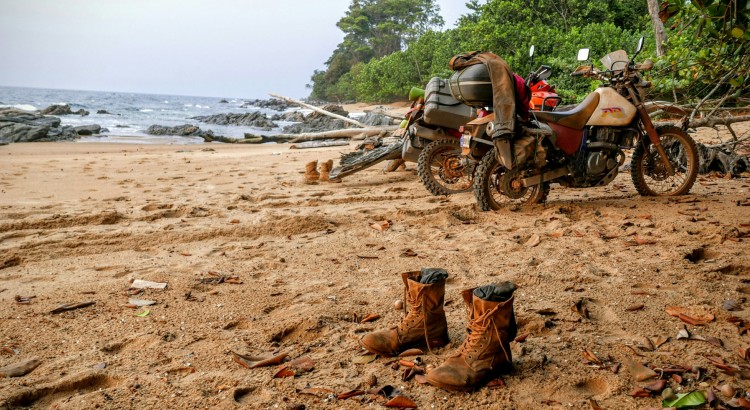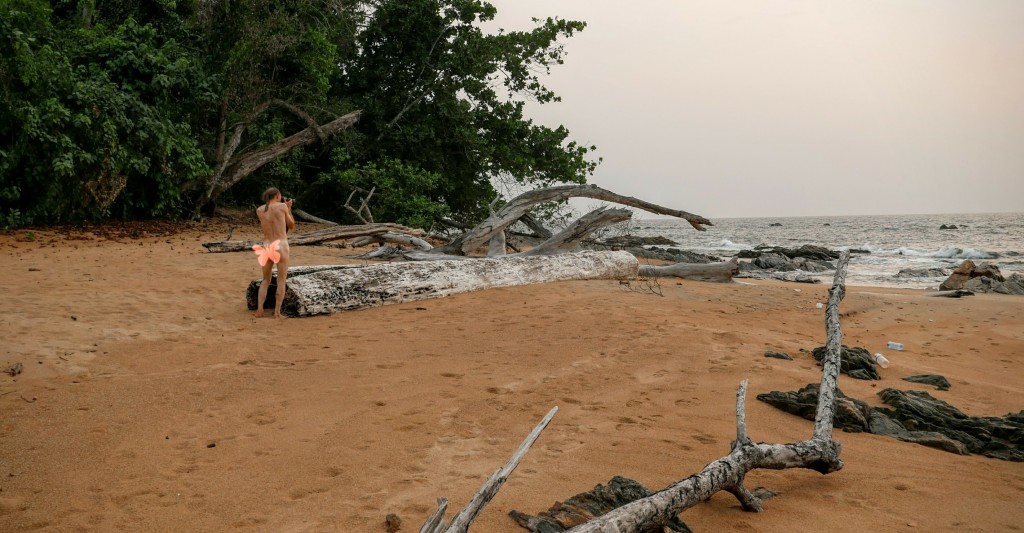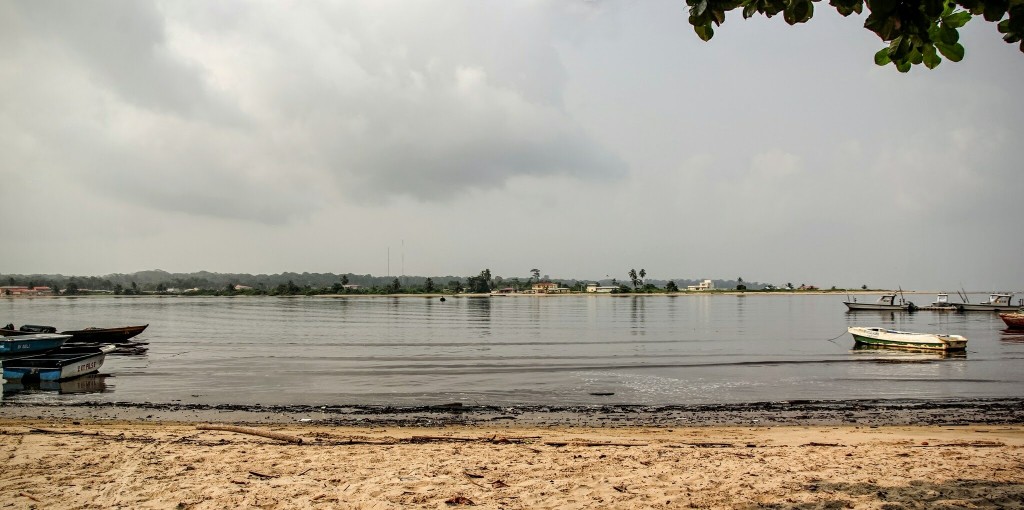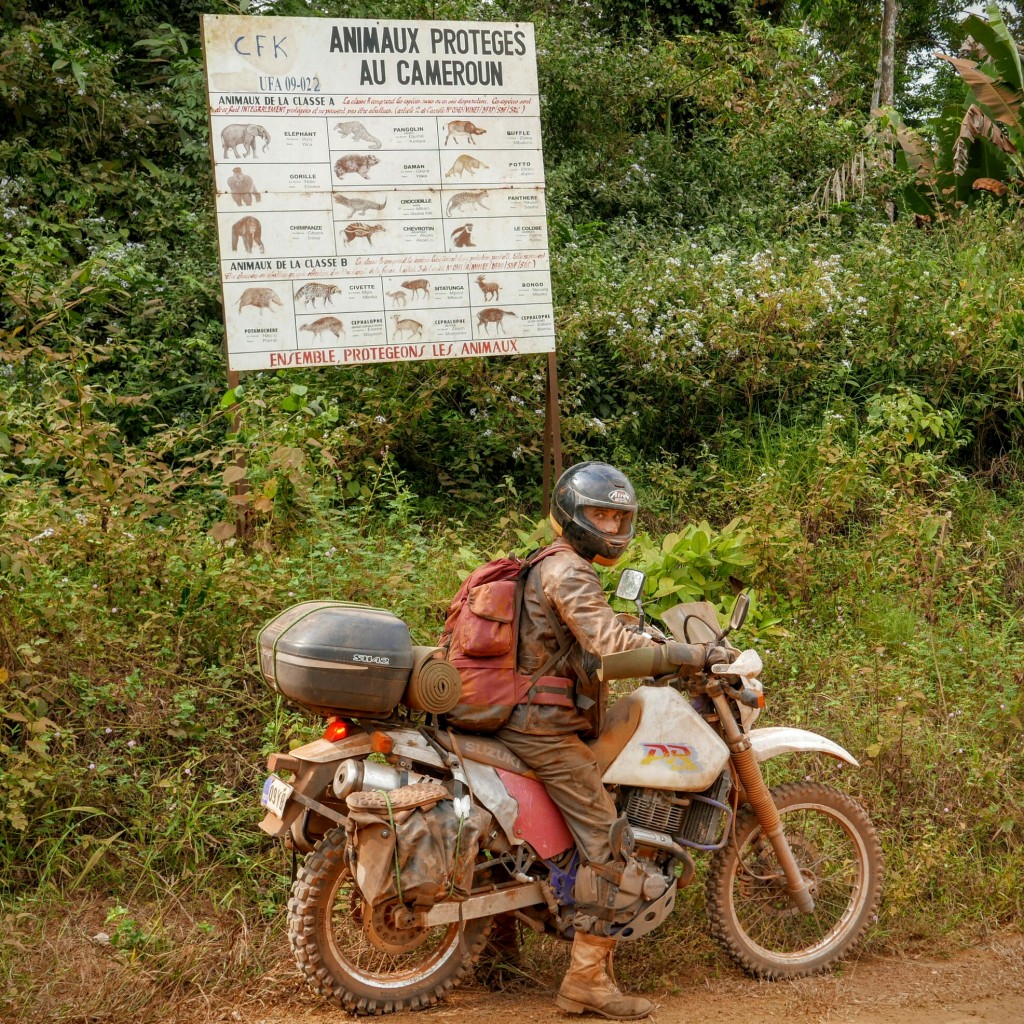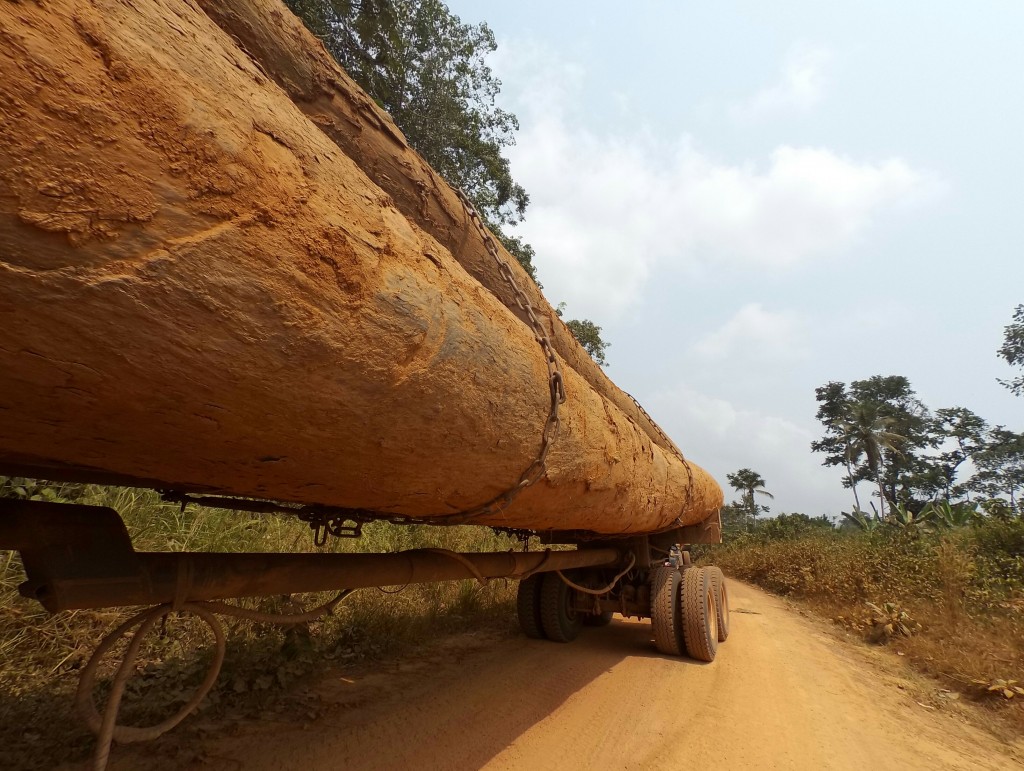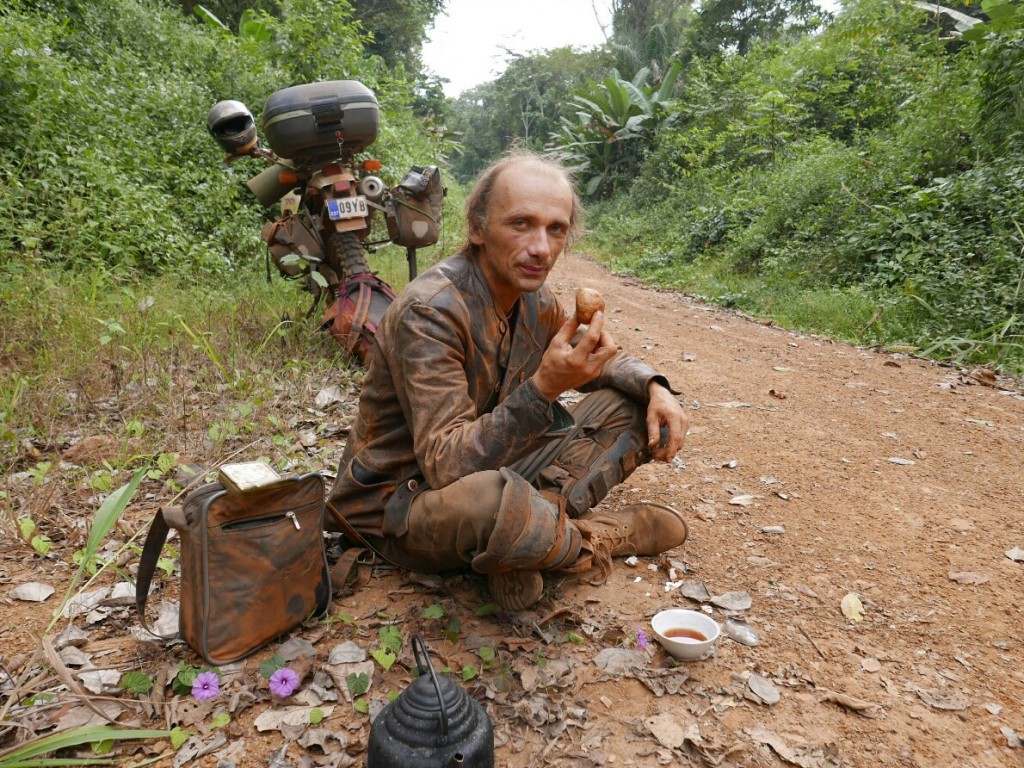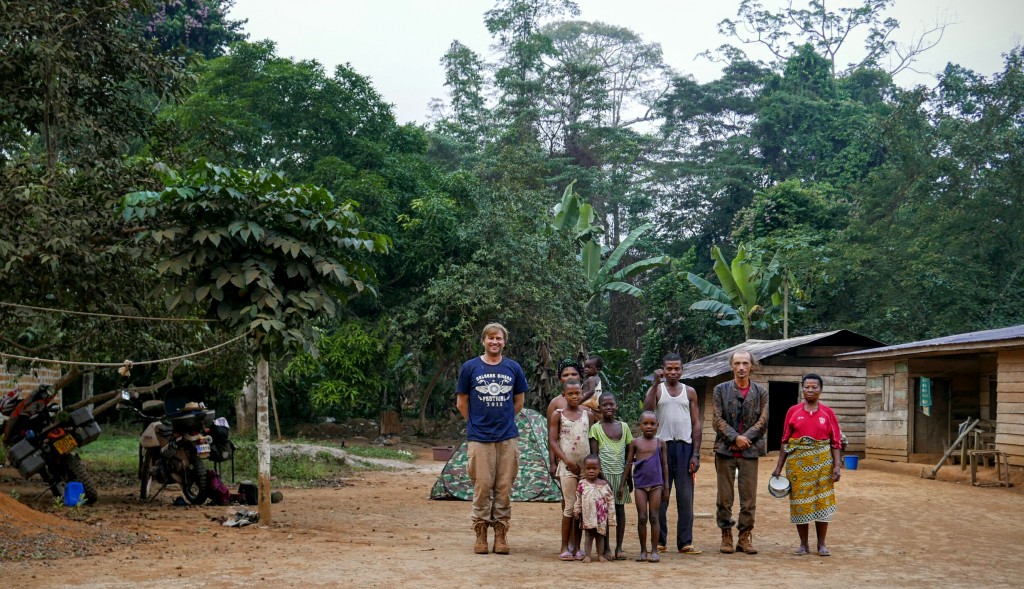In the morning we saw someone showing of his catch just a few miles from our campsite. He was holding a headless snake up high but it was still taller than the dude without the head on. It was one fat snake – maybe 20cm diameter. We tend to spend the evenings arguing, which of the wild animals we should be afraid of. I’m always pitching for de snake.
Camping trouble
New photo added to shared album
Camping can be quite demanding in the rainforest. You gotta make fire when everything is slightly wet, you have plenty of mosquitos to fight and imaginary lions to talk about. And in the morning you have to pack up the tent.
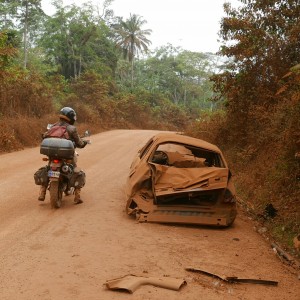 160km of a dust road later we hit Kribi, a larger village on the coast. When you see a shack with plastic stools, you know it is a bar. And when you want to eat, they will send someone to their grandma and fetch some. The meals are always the same – rice, cous cous or boiled plantain and then a side dish – a bouillon of fish or a chicken leg. Sets you back €1-€2. Locals were watching cross-country skiing in the bar at Kribi. I guess it is the equivalent of walking into a bar in rural Estonia with National Geographic on.
160km of a dust road later we hit Kribi, a larger village on the coast. When you see a shack with plastic stools, you know it is a bar. And when you want to eat, they will send someone to their grandma and fetch some. The meals are always the same – rice, cous cous or boiled plantain and then a side dish – a bouillon of fish or a chicken leg. Sets you back €1-€2. Locals were watching cross-country skiing in the bar at Kribi. I guess it is the equivalent of walking into a bar in rural Estonia with National Geographic on.
Ocean is a blessing. The cool breeze dries the sweat that flows down the neck in streams in the jungle. There are no mosquitos and no danger of imaginary lions. Between 4:30pm and 7pm through the sunset the heat becomes almost tolerable. But then suddenly around 7:30-8pm you get sweat gushing down your face, neck and back. During the first couple of days I suspected fever or even malaria, but as the pattern continued I realised it is just the humidity. When the temperature drops from 38C to maybe 33C, the air humidity gets to near 100% and your body starts fighting the heat with sweat.
We’re now 30km away from Equatorial Guinea and the soldiers at the last checkpoint said there is some kind of a barge that crosses the border river. Now the problem is that if they don’t sell us a visa on the border, we won’t be able to return to Cameroon, because our visa was single entry. I guess if that happens we just need to get the barge to take us upriver and smuggle ourselves into one of those countries.
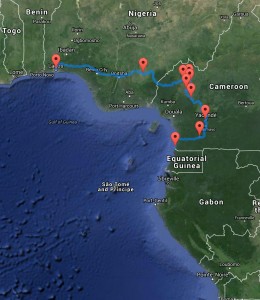 The port at the rivermouth separating Guinea from us is nothing but a landing patch for plastic canoe like boats. There are canoes coming loaded with boxes of Heineken from Guinea and lads going to chest deep in water to offload the boxes and carry onto a waiting truck. Later we realise that the person sailing boat is guinean and he won’t be allowed to step on the Cameroonian soil. The border is closed. For people, but not for Heineken. I speak to the boss of the Cameroonian border guard – the border is closed. He then sends me back to the village to speak to his boss. The border is still closed. I get escalated to the top man on that part of Cameroon, a nice old dude, who is merrily mowing the lawn at the back of his house. He explains that it wouldn’t be a problem for him to put us with the bikes on the boat and send across, but over the last 2 years he has not seen a homme blanc accepted through on the Guinea side. He refuses to even let us try, because apparently Guineans are brutal. I suggest that they are humans too and surely they can be reasoned with, but he only grins on the “humans too” statement. Everyone here speaks of Guineans with a bit of mysticisism and hint their neighbours are not that civilised. I’ve read similar comments on forums, about dead bodies lying near the football stadium when they hosted Africa Cup and no-one taking care of the corpses. When I dig in a bit more, the Cameroonian arguments aren’t that strong: “They don’t even speak French there.” On the other hand Guinea has the highest per capita GDP in Africa.
The port at the rivermouth separating Guinea from us is nothing but a landing patch for plastic canoe like boats. There are canoes coming loaded with boxes of Heineken from Guinea and lads going to chest deep in water to offload the boxes and carry onto a waiting truck. Later we realise that the person sailing boat is guinean and he won’t be allowed to step on the Cameroonian soil. The border is closed. For people, but not for Heineken. I speak to the boss of the Cameroonian border guard – the border is closed. He then sends me back to the village to speak to his boss. The border is still closed. I get escalated to the top man on that part of Cameroon, a nice old dude, who is merrily mowing the lawn at the back of his house. He explains that it wouldn’t be a problem for him to put us with the bikes on the boat and send across, but over the last 2 years he has not seen a homme blanc accepted through on the Guinea side. He refuses to even let us try, because apparently Guineans are brutal. I suggest that they are humans too and surely they can be reasoned with, but he only grins on the “humans too” statement. Everyone here speaks of Guineans with a bit of mysticisism and hint their neighbours are not that civilised. I’ve read similar comments on forums, about dead bodies lying near the football stadium when they hosted Africa Cup and no-one taking care of the corpses. When I dig in a bit more, the Cameroonian arguments aren’t that strong: “They don’t even speak French there.” On the other hand Guinea has the highest per capita GDP in Africa.
There are again dozens of checkpoints on Cameroon roads, but unlike Nigeria you shouldn’t drive through. Fascinating is that almost every patrol officer is drunk. Border officers at the port were happily drinking beer at 8am in the morning.
The border remains closed and we’re sent around Guinea to enter Gabon in the east on the other side of Guinea. They suggest we can pass on the bikes through the Ma’an wildlife reserve. 230km to first tarmac.
Logging is one of Cameroon’s biggest incomes. But it is bloody hard. First you have to get to the trees and then you have to knock the monsters down one by one selectively, otherwise it won’t be possible to replenish the rainforest. A trailer like this can take 3 trunks at most.
We have a technical pitstop for Juka’s flat rear and by the time we’re finished the sun is switched off and the rain is switched on. We stopped under a tree next to a couple of houses and we ask the chief if we can set up camp in his village.
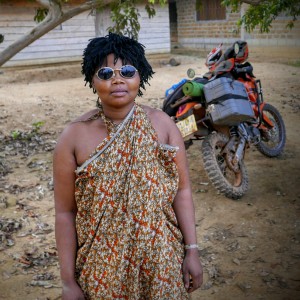 The tent is hoisted in the middle of the central square of this one family village. We make tea, talk bullshit french of gorillas, elephants, plantains and forestry. In the morning as the village gathers to send us off, the woman of the house keeps asking for a souvenire. Juka gives up his sunglasses that he has no use for and the photo session ensues, where every memeber of the family gets to try them on and pose for the camera.
The tent is hoisted in the middle of the central square of this one family village. We make tea, talk bullshit french of gorillas, elephants, plantains and forestry. In the morning as the village gathers to send us off, the woman of the house keeps asking for a souvenire. Juka gives up his sunglasses that he has no use for and the photo session ensues, where every memeber of the family gets to try them on and pose for the camera.
We push on for Gabon through the rainforest hugging the strip of red dust road.
